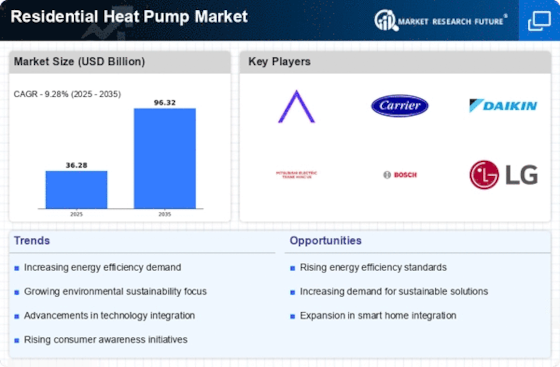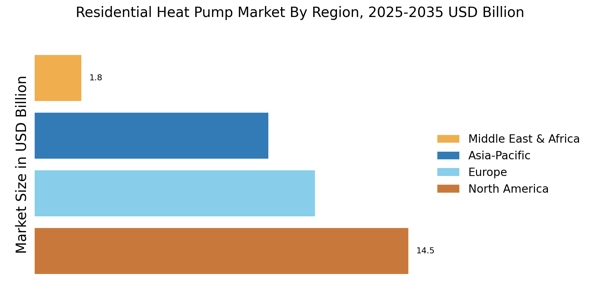Rising Energy Costs
The escalating costs of traditional energy sources are driving consumers to seek more efficient alternatives. In the Residential Heat Pump Market, this trend is particularly pronounced as homeowners look to mitigate their energy expenses. With energy prices projected to rise, heat pumps, which offer lower operational costs compared to conventional heating systems, are becoming increasingly attractive. The potential for significant savings on energy bills, combined with government incentives for energy-efficient appliances, is likely to bolster the adoption of heat pumps. As a result, the Residential Heat Pump Market is expected to witness a surge in demand, as consumers prioritize cost-effective solutions for their heating and cooling needs.
Technological Innovations
Technological advancements in heat pump design and efficiency are significantly influencing the Residential Heat Pump Market. Innovations such as variable-speed compressors and advanced refrigerants are enhancing the performance and reliability of heat pumps. These developments not only improve energy efficiency but also expand the operational range of heat pumps, making them suitable for diverse climates. As manufacturers continue to invest in research and development, the introduction of smarter, more efficient models is expected to attract a broader consumer base. This trend suggests that the Residential Heat Pump Market will continue to evolve, driven by the demand for cutting-edge technology that meets modern energy needs.
Urbanization and Housing Trends
The ongoing trend of urbanization is influencing the Residential Heat Pump Market in various ways. As more people move to urban areas, the demand for efficient heating and cooling solutions in residential buildings is increasing. Urban dwellings often face space constraints, making heat pumps an ideal choice due to their compact design and versatility. Additionally, new housing developments are increasingly incorporating energy-efficient technologies, including heat pumps, to meet the expectations of environmentally conscious buyers. This trend suggests that the Residential Heat Pump Market will continue to grow, driven by the need for innovative solutions that cater to the demands of modern urban living.
Government Incentives and Regulations
Government policies aimed at promoting energy efficiency are playing a crucial role in shaping the Residential Heat Pump Market. Various countries have implemented incentives such as tax credits, rebates, and grants to encourage the installation of heat pumps. These initiatives not only reduce the upfront costs for consumers but also align with broader environmental goals. For instance, regulations mandating reductions in greenhouse gas emissions are pushing homeowners towards more sustainable heating options. Consequently, the Residential Heat Pump Market is likely to experience growth as these incentives make heat pumps a more viable choice for consumers looking to comply with new regulations while also benefiting from financial support.
Environmental Concerns and Sustainability
Increasing awareness of environmental issues is prompting consumers to seek sustainable heating solutions. The Residential Heat Pump Market is benefiting from this shift as heat pumps are recognized for their lower carbon footprint compared to traditional heating systems. As more individuals prioritize eco-friendly options, the demand for heat pumps is likely to rise. Furthermore, the push for sustainability is supported by various organizations advocating for reduced reliance on fossil fuels. This growing emphasis on environmental responsibility is expected to propel the Residential Heat Pump Market forward, as consumers align their purchasing decisions with their values regarding sustainability.

















